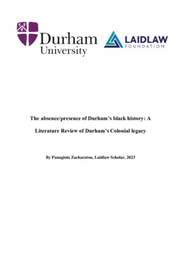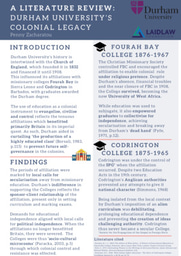Global Citizenship and Ethical Leadership:
Over the past two years, my journey with the Laidlaw Programme has been one of profound personal and professional growth. I embarked on this adventure eager to expand my horizons and understand more about myself, society and how to be an ethical leader. Through this experience, I have not only honed my research skills and built resilience but also developed a deeper understanding of what true leadership entails. I have learned how to better navigate complex social issues with sensitivity and a global perspective, something particularly put into practice during my LiA experience. Reflecting on my journey feels surreal, as the two years seem to have passed by in the blink of an eye, yet I have learnt so much and truly been impacted as an individual. I am excited to continue making a positive impact as a global citizen.
One of the most significant components of the Laidlaw Programme was engaging in independent research. Researching into the absence of Durham University's colonial history, during a summer of some personal difficulty, culminated in a 4000-word essay output that was referenced in a Durham academic journal. While the project research felt very broad to begin with, I learnt to narrow down and focus both my research and my argument, collaborating closely with my supervisors to inform my work. Looking into archives and primary evidence was eye-opening, developing my critical analysis and allowing me to understand the role of universities in colonial histories. Equally, researching this topic gave me a more nuanced understanding of the construction of history and power dynamics involved in historical representation. I learned to navigate sensitive topics with care and respect, understanding that historical research is not just about uncovering facts but also about recognising the voices and experiences that have been marginalised. This not only sharpened my research skills but deepened my understanding of the importance of inclusive narratives that reflect a more honest account of the past. Moreover, learning how to structure my time and staying disciplined with the project taught me commitment, and the rewarding outcomes this can achieve.
Undoubtedly, the most transformative experience during my time in the Laidlaw Programme was my six-week volunteering LiA project with the Refugee Advice and Casework Service (RACS) in Sydney, Australia. This opportunity to work with a legal NGO dedicated to supporting refugees and asylum seekers was both challenging and enlightening. It pushed me out of my comfort zone and required me to confront the harsh realities faced by refugees, while myself adjusting to a new country away from home.
Working with RACS was an invaluable experience that truly impacted me as an individual, while testing my resilience in many ways. The work itself was emotionally demanding, as hearing stories of displacement, trauma, and uncertainty was definitely difficult, and really put my own privilege into perspective. I learnt the details of the Australian immigration system, and spoke over the phone and in person to clients regularly. I had to learn how to manage my emotions, maintain professionalism, and offer empathy and support to clients who had experienced unimaginable hardships. Watching my team and the individuals working at RACS was truly eye-opening in teaching me how to lead by example, with the clients’ wellbeing always being at the forefront of all our work. While I found the first week challenging, this strengthened my resolve and commitment to advocating for social justice. I learned the importance of resilience not just as an individual trait but as a critical component of effective leadership. Being resilient means more than just enduring difficulties; it means actively finding solutions, maintaining hope, and inspiring others to do the same. My time at RACS has inspired my professional plans, and I hope to continue leading ethically and fighting for what is right as a lawyer in the future.
Both of these experiences—my research on Durham University's colonial history and my work with RACS—have profoundly shaped my understanding of ethical leadership and what it means to be a global citizen. I have come to realise that ethical leadership is not just about making the right decisions but about making decisions that are informed by empathy, integrity, and a deep understanding of social justice. It is about recognising our own privileges and using them to advocate for and uplift others. Being a global citizen means being aware of the interconnectedness of our world and the impact of our actions on others. It means recognising that we all have a role to play in addressing global challenges, whether they be historical injustices, refugee crises, or other forms of inequality. My experiences in the Laidlaw Programme have taught me that being a global citizen is not just about traveling to new places or learning about different cultures; it is about taking responsibility for the kind of world we want to create and actively working towards it.
As I look to the future, I will carry forward the lessons I have learned in the Laidlaw Programme. I will strive to be a leader who is not afraid to confront difficult issues, who listens to and amplifies marginalised voices, and who makes decisions grounded in empathy and integrity. I would love to return to RACS once my studies are completed, and hope my future work will be within the field of human rights law.
My time as a Laidlaw Scholar has truly been transformative, equipping me with perspective, knowledge and resilience. I am committed to living these values every day as I move forward, continuing to grow and make a positive impact where I can.


Please sign in
If you are a registered user on Laidlaw Scholars Network, please sign in